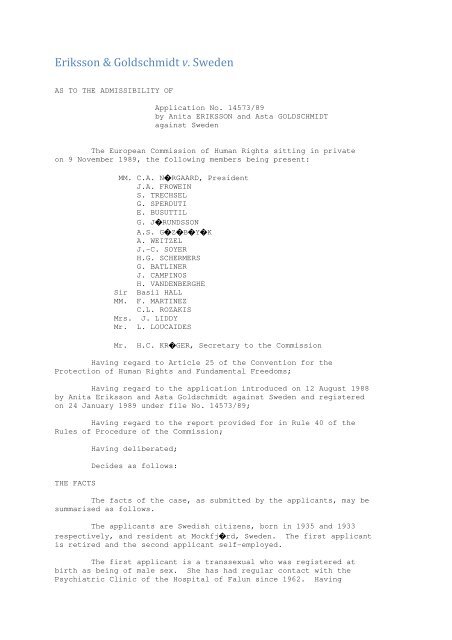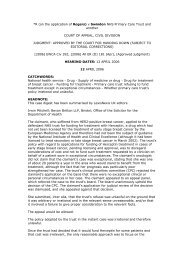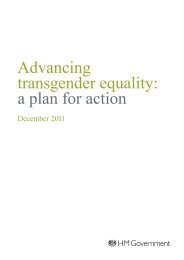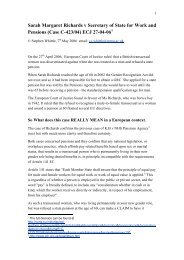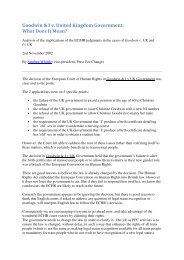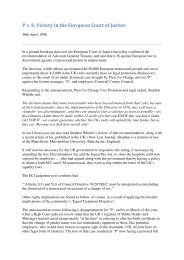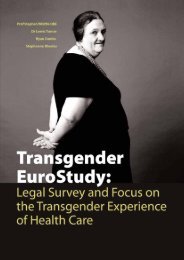Eriksson & Goldschmidt v. Sweden
Eriksson & Goldschmidt v. Sweden
Eriksson & Goldschmidt v. Sweden
Create successful ePaper yourself
Turn your PDF publications into a flip-book with our unique Google optimized e-Paper software.
<strong>Eriksson</strong> & <strong>Goldschmidt</strong> v. <strong>Sweden</strong>AS TO THE ADMISSIBILITY OFApplication No. 14573/89by Anita ERIKSSON and Asta GOLDSCHMIDTagainst <strong>Sweden</strong>The European Commission of Human Rights sitting in privateon 9 November 1989, the following members being present:MM. C.A. NRGAARD, PresidentJ.A. FROWEINS. TRECHSELG. SPERDUTIE. BUSUTTILG. JRUNDSSONA.S. GZBYKA. WEITZELJ.-C. SOYERH.G. SCHERMERSG. BATLINERJ. CAMPINOSH. VANDENBERGHESir Basil HALLMM. F. MARTINEZC.L. ROZAKISMrs. J. LIDDYMr. L. LOUCAIDESMr. H.C. KRGER, Secretary to the CommissionHaving regard to Article 25 of the Convention for theProtection of Human Rights and Fundamental Freedoms;Having regard to the application introduced on 12 August 1988by Anita <strong>Eriksson</strong> and Asta <strong>Goldschmidt</strong> against <strong>Sweden</strong> and registeredon 24 January 1989 under file No. 14573/89;Having regard to the report provided for in Rule 40 of theRules of Procedure of the Commission;THE FACTSHaving deliberated;Decides as follows:The facts of the case, as submitted by the applicants, may besummarised as follows.The applicants are Swedish citizens, born in 1935 and 1933respectively, and resident at Mockfjrd, <strong>Sweden</strong>. The first applicantis retired and the second applicant self-employed.The first applicant is a transsexual who was registered atbirth as being of male sex. She has had regular contact with thePsychiatric Clinic of the Hospital of Falun since 1962. Having
eceived a certificate from the Clinic stating that for medicaland mental reasons she needed to act as a woman in everyday life, sherequested the National Board of Health and Welfare (socialstyrelsen)to change her Christian name and to determine that she is of femalesex. On 23 September 1980 the National Board decided in accordance withSection 1 of the 1972 Act on the Determination of Sex in SpecialCircumstances (lagen om faststllande av knstillhrighet i vissafall) that the first applicant should be considered as being of femalesex. The Board referred her request for a change of name to thePatent and Registration Office (patent- och registreringsverket) withits recommendation that the name be changed. The Patent andRegistration Office on 22 October 1980 changed her Christian name fromSven Ove to Anita Birgitta. On 30 October 1980 the National TaxBoard (riksskatteverket) gave the applicant a new personal identitynumber (personnummer) indicating that she is a woman. The applicantwas subsequently registered in the population record as being offemale sex. The applicant never had any surgical treatment and isphysically still of male sex.The applicants are living in a heterosexual relationship.Their request for a marriage licence was rejected by the Parish CivilRegistration Office (pastorsmbetet) of Mockfjrd on 11 November 1984on the ground that both applicants were of female sex. Theapplicants asked the Government for an exemption from the relevantprovisions of the Marriage Code (giftermlsbalken). The Governmenton 11 September 1986 dismissed their request as it was not withintheir competence to grant such an exemption.The applicants made a new request for a marriage licence whichwas rejected by the Parish Civil Registration Office on 11 May 1987.The applicants appealed to the Cathedral Chapter (domkapitlet) ofVsters which on 9 September 1987 confirmed the decision of theParish Civil Registration Office. The applicants' further appealwas rejected by the Administrative Court of Appeal (kammarrtten) ofSundsvall on 17 November 1987. On 19 February 1988 the SupremeAdministrative Court (regeringsrtten) refused leave to appeal.COMPLAINTSThe applicants allege a violation of Article 12 of theConvention as they have been refused the right to marry. They maintainthat they should have the right to marry as they are of oppositebiological sex. They point out that long before the first applicanthad her registered sex changed she had acted as a woman in order tofacilitate everyday life. She would then have been allowed to marrythe second applicant. The applicants furthermore point out that thefirst applicant would, although she is physically a man, in principlebe allowed to marry another man.THE LAWThe applicants allege a violation of their right to marry asguaranteed by Article 12 (Art. 12) of the Convention.Article 12 (Art. 12) of the Convention reads as follows:"Men and women of marriageable age have the right to marry andto found a family, according to the national laws governingthe exercise of this right".
In the Rees case, the Court stated as follows (Eur. Court ofH.R., Rees judgment of 17 October 1986, Series A no. 106, p. 19,paras. 49-51):"In the Court's opinion, the right to marry guaranteed byArticle 12 (Art. 12) refers to the traditional marriage betweenpersons of opposite biological sex. This appears also from thewording of the Article which makes it clear that Article 12 (Art. 12)is mainly concerned to protect marriage as the basis of the family.Furthermore, Article 12 (Art. 12) lays down that the exercise of thisright shall be subject to the national laws of the ContractingStates. The limitations thereby introduced must not restrictor reduce the right in such a way or to such an extent thatthe very essence of the right is impaired. However, thelegal impediment in the United Kingdom on the marriage ofpersons who are not of the opposite biological sex cannot besaid to have an effect of this kind.There is accordingly no violation in the instant case ofArticle 12 (Art. 12) of the Convention."The Commission notes that the present applicants, althoughbiologically of opposite sex, are under Swedish law both of femalesex. This is so since the first applicant has, for medical and mentalreasons, freely chosen to adopt the female sex and this change hasbeen recognised in accordance with the Act on the Determination of Sexin Special Circumstances. Consequently, under Swedish law theapplicants do not have the right to marry as they are legally of thesame sex.The Commission considers that the right to marry underArticle 12 (Art. 12) of the Convention only covers the right to marrysomeone of the opposite sex. It accepts that this applies alsowhere, as in the present case, the couple are not biologically of thesame sex but where one of the partners has obtained the same sexstatus as the other partner through a voluntary act recognised underdomestic law.It follows that the application is manifestly ill-foundedwithin the meaning of Article 27 para. 2 (Art. 27-2) of the Convention.For these reasons, the CommissionDECLARES THE APPLICATION INADMISSIBLESecretary to the CommissionPresident of the Commission(H.C. KRGER)(C. A. NRGAARD)


